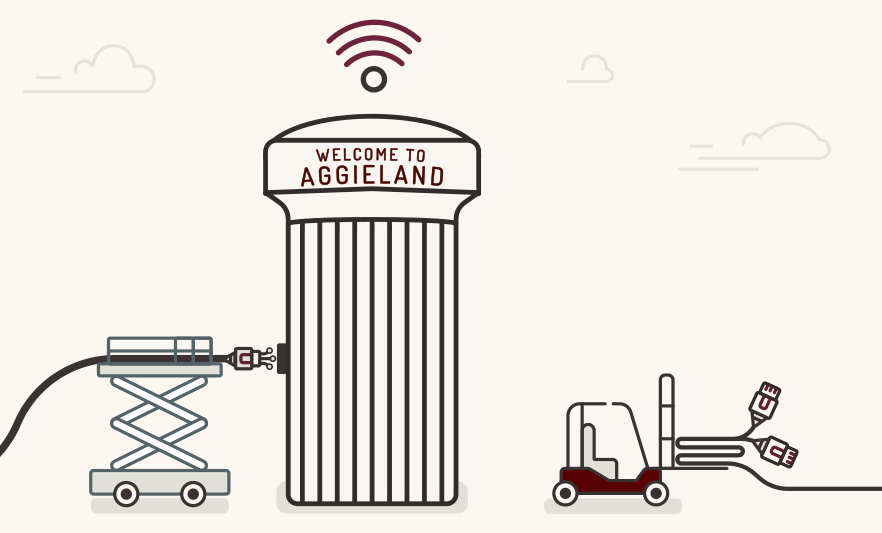Why a new network?
Texas A&M's College Station campus is one of the largest in the country, spread over 5,200 acres. On a typical day, over 100,000 devices connect to the campus network, transferring over 60 terabytes of information. The university needs a state-of-the-art, fast and dependable data network to continue its path forward.
Evolution of a Network
The seeds of the campus data network were sown in 1988 when the College of Engineering wired four buildings with Ethernet cables. Texas A&M's network has continued to grow organically for decades, and while it initially met campus needs, a new network is needed to support a university the size and complexity of Texas A&M.
The Next-Gen Network will meet the needs of the university into the future:
- Wireless-First Design, powered by WiFi 6E - Wireless connectivity is now more prevalent than wired ethernet connections. This shift was further amplified during the COVID-19 pandemic, as students and employees learned and worked remotely.
- Power the Internet of Things (IoT) - Campus members now bring between three and nine devices to campus each day, including watches, laptops and tablets. The Next-Gen Network will support all smart devices.
- Robust Security Standards - Network segmentation is critical to remaining competitive as an R1 university. Researchers must be able to create secure, private networks for their labs as required by all future large-scale federal programs.
What Does This Mean For Me?
 Students
Students
Stronger, more consistent Wi-Fi signals and significantly improved support for IoT devices will allow more devices to connect to the network in more places.
Higher network speeds and increased capacity mean whatever device you're using, you'll see faster performance and less lag time once upgrades are complete. That's more bandwidth for all computing needs, including streaming and gaming.
 Faculty & Researchers
Faculty & Researchers
Virtually "unlimited" bandwidth will enable researchers to accelerate their work as they seek new discoveries and scientific breakthroughs.
A future-proof network ensures that as the pace of technology continues to increase, faculty will be empowered to meet the challenge, leading the way in innovative teaching, research and service.
 IT Professionals
IT Professionals
Network segmentation will increase cybersecurity protection, letting us separate types of traffic and customize service levels while providing essential protection against the very real threat of ransomware and cyber attacks.
A sturdy and more reliable network means the risk of outages or downtime will be virtually eliminated, greatly improving the resiliency of the network.
Network of the Future
Thanks to the investment of university and System leadership, the Next Generation Aggie Network will put Texas A&M on track to expand our impact and increase innovation. The new network will provide a modern, resilient, and secure research and education network to better meet the future demands of Texas A&M educators, researchers and students. The Next-Gen Network is Texas A&M's network — the backbone of our success.
Resilient & Stable Network
Upgraded network components will improve network stability and deliver a consistent experience across campus.
Increased Speed & Bandwidth
Researchers will benefit from easy access to multi-gigabit connectivity, no matter where they are working on campus.
Expanded Wireless Coverage
Increased Wi-Fi 6E coverage across campus, with speeds that are up to five times faster and designed to reduce congestion in high-traffic areas.
5G and IoT Capability
This advanced, world-class network will include 5G and IoT (Internet of Things) technology allowing almost limitless opportunities for innovation.
Strengthened Security
Ability to logically and effectively segment network traffic for maximum security and functionality.
On Track for the Future
The high-speed, flexible and secure network will help recruit and support faculty to ensure we remain competitive with peer institutions.

Next-Gen Project Plan
The Next-Gen Network project will run in three concurrent phases designed to systematically upgrade each part of the campus network over approximately three years.
See the Project Plan